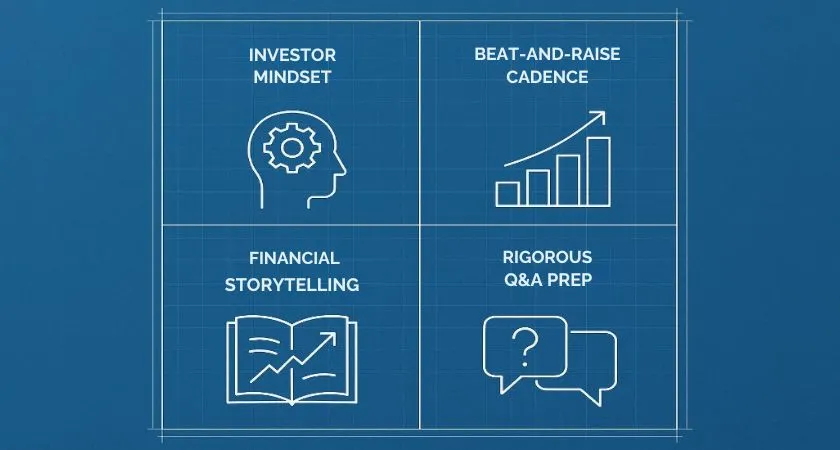The Undervaluation Dilemma: You Have an IR Person, So Why Doesn't Wall Street Get It?
In 20 years as an institutional investor, I saw this pattern repeatedly: exceptional companies with mediocre stock performance. They had IR teams checking all the boxes — earnings calls, press releases, investor meetings scheduled like clockwork. But something fundamental was missing.
I remember evaluating a mid-cap software company that had grown revenue 240% year-over-year for three consecutive quarters. Their IR person was diligent, responsive, and knew every metric by heart. Yet their stock traded at a 30% discount to peers. The disconnect wasn't in their numbers, it was in their narrative. No one was translating their operational excellence into the forward-looking conviction that Wall Street rewards with premium valuations.
You've hit your numbers. Your IR team is busy. But your valuation hasn't budged.
If this sounds familiar, you're experiencing the gap between having an "IR person" and having a strategic IR partner who can actually help move your stock price. Most companies assume that hiring someone to manage investor relations automatically translates to effective investor relations strategy. It doesn't.
As someone who has sat on both sides of the table — first as an investor evaluating companies, then as SVP of Finance & IR at a public software company — I can tell you definitively: there's a world of difference between reporting your story and engineering it for maximum impact.
The question isn't whether you need investor relations. It's whether you're getting the strategic value that drives valuation, or just the administrative function that manages compliance.
The Tale of Two Roles: IR Administrator vs. Strategic IR Partner
Most IR job descriptions read like a compliance checklist. And frankly, that's exactly what many companies get — a diligent administrator who ensures regulatory requirements are met and investor inquiries are answered. This approach treats IR as a necessary cost center rather than a strategic asset.
But sophisticated investors don't reward companies for meeting minimum requirements. They reward companies for clarity, predictability, and conviction.
Here's the critical distinction most CEOs and CFOs miss:
The Traditional IR Person (The Administrator)
The standard IR professional focuses on:
- Managing earnings call logistics and ensuring compliance
- Distributing press releases and regulatory filings on schedule
- Responding to inbound investor inquiries reactively
- Preparing management for conference attendance
- Writing earnings scripts
- Maintaining accurate historical reporting
- Operating within Sarbanes-Oxley Act requirements and disclosure protocols
This role is necessary, but it's not sufficient for driving valuation.
The Strategic IR Partner (The Architect)
A strategic IR partner operates at a completely different level:
- Engineers forward-looking investor narratives that connect current performance to future potential
- Proactively shapes guidance strategy and selects KPIs that make the company easily "analyzable" for Wall Street
- Coaches executives on investor psychology and prepares them for the tough questions I would have asked as an institutional investor
- Translates business strategy into Wall Street language that resonates with portfolio managers' decision-making process
- Builds long-term investor conviction through consistent narrative execution
The difference is profound: Most IR professionals are tasked with accurately reporting history. A strategic IR partner is tasked with building investor belief in the future. The first is about compliance; the second is about valuation.
When I was evaluating companies as an investor, I could immediately tell which companies had strategic IR counsel and which had administrative IR support. The companies with strategic partners had clearer narratives, more predictable performance, and more confident management teams. Not surprisingly, they also had higher valuations.

The Investor-Operator Playbook: Four Pillars of Strategic IR Excellence
Having spent two decades evaluating management teams and then serving as an SVP of Finance & IR myself, I've identified four critical pillars that separate strategic IR professionals from the rest. These aren't theoretical concepts, they're battle-tested strategies that I've used both to evaluate companies as an investor and to drive valuation as an operator.
1. Master the Beat-and-Raise Cadence
This isn't about sandbagging guidance. It's about engineering confidence through consistent execution. This is what Iinvestors call the beat-and-raise, and it’s your first and potentially most potent pillar.
As an investor, nothing built my confidence in a management team faster than their ability to set credible guidance and consistently outperform it. But this requires more than conservative forecasting. It requires building granular, bottoms-up financial models that provide genuine predictability.
A strategic IR partner helps companies develop this capability by working with finance teams to stress-test assumptions, identify leading indicators, and structure guidance in a way that allows for consistent outperformance. The goal is creating the trust pattern that Wall Street rewards with higher multiples.
When I was evaluating investments, companies that mastered the beat-and-raise cadence earned a "reliability premium" in my valuation models. Their consistent execution reduced my risk assessment and increased my conviction in their long-term prospects.
2. Engineer a Defensible Financial Narrative
Most companies overwhelm investors with data instead of providing insight. A strategic IR partner does the opposite — they help select 3-5 key KPIs that make the company easily "analyzable" and connect those metrics to strategic meaning.
This isn't about choosing flattering numbers. It's about identifying the forward-looking indicators that best predict your business trajectory and teaching investors how to evaluate your performance through that lens.
During my investor days, the companies I backed were those that could explain their business model in terms I could easily incorporate into my investment thesis. They didn't just report revenue growth — they explained how their customer acquisition metrics and retention rates drove that growth and what it meant for future performance.
A strategic IR partner translates complex business models into simple, compelling investor stories that focus on predictive value rather than historical performance.
3. Conduct Investor-Grade Q&A Preparation
Generic presentation training isn't enough. Strategic IR requires rigorous simulation and stress-testing of leadership responses from an actual investor's perspective.
As an institutional investor, I asked tough questions designed to uncover potential risks and test management's depth of thinking. I wanted to see how they responded under pressure, whether they understood their own vulnerabilities, and if they could think strategically about their market position.
A strategic IR partner prepares executives for these moments by conducting the same type of rigorous questioning I would have done as an investor. The goal isn't to script responses, but to build unshakeable confidence and ensure leadership can control the narrative in any investor interaction.
This preparation extends beyond earnings calls to investor meetings, roadshows, and crisis communications. When management has been stress-tested by someone who thinks like an institutional investor, they're prepared for anything the Street can throw at them.
4. Think Like a Buy-Side Investor
This is what underpins everything else: a strategic IR partner understands portfolio managers' pressures, valuation methodologies, and the specific triggers that drive buy/sell decisions.
Many Most IR professionals have never managed institutional capital or been responsible for investment performance. They don't understand the psychological and structural factors that drive investor behavior. A strategic partner brings that institutional perspective to every decision.
When I transitioned from investor to operator, this perspective was invaluable. I could see our company through my former colleagues' eyes and anticipate their concerns before they became problems. I understood which metrics they would focus on, what questions they would ask, and how our narrative would fit into their investment thesis.
A strategic IR partner provides this "investor feedback loop" to help management see their company objectively and position their story for maximum impact.

Building Internal Buy-In: From Resistance to Strategic Alignment
The most strategic IR counsel in the world won't help if you can't get your team aligned around the investment. As someone who has navigated these conversations from the executive suite, I can offer specific talking points for the most common objections:
For the Skeptical CFO: "This isn't an expense; it's an investment in market valuation. A partner who thinks like an investor can help us de-risk our guidance strategy and earn the premium multiple we deserve. The cost of strategic IR counsel is a fraction of the value unlocked by even a modest improvement in our trading multiple."
For the Threatened IR Team: "This is a force multiplier, not a replacement. We're bringing in specialist expertise to enhance our strategy and help you deliver breakthrough results, elevating our entire function. Think of it as having a former institutional investor on your advisory board."
For the Cost-Conscious Board: "The gap between our performance and our valuation represents millions in unrealized shareholder value. Strategic IR counsel helps us capture that value through better positioning and more effective investor communication."
The key is framing this correctly internally. You're not outsourcing a function — you're insourcing an invaluable perspective that your team can leverage to win. The most successful strategic IR engagements are collaborative partnerships where external expertise elevates internal capabilities.
Demand More From Your Investor Relations
Stop accepting the gap between your company's performance and its stock price. The disconnect between great companies and great valuations isn't inevitable. It's solvable through strategic investor relations that goes far beyond compliance and administration.
A standard IR person ensures you meet regulatory requirements and respond to investor inquiries. A strategic IR partner engineers the narrative that drives valuation, coaches your team for high-stakes interactions, and brings the institutional investor perspective that separates premium-valued companies from the rest.
Having sat on both sides of the table — as the investor evaluating your story and the executive telling it — I can assure you: the gap between exceptional performance and exceptional valuation is bridgeable. But it requires more than an IR person. It requires a strategic partner who speaks investor.
The companies that recognize this distinction and act on it are the ones that consistently trade at premium valuations. The ones that don't remain perpetually undervalued, wondering why the market doesn't "get it."
Your performance deserves a premium valuation. Your investors deserve strategic clarity. Your IR function deserves to be a valuation driver, not just a compliance cost center.
Ready to transform your investor communications from cost center to valuation driver? Schedule a confidential strategic consultation with Jason Gold to discover how an investor-led approach can change your story.
Frequently Asked Questions
Q: What's the difference between an IR person and strategic IR?
A: An IR person manages compliance and communications; strategic IR engineers narratives that drive valuation through investor psychology and institutional perspective.
Q: Why do companies with IR teams still struggle with valuation?
A: Most IR functions focus on reporting history rather than building investor conviction in future potential. They lack the institutional investor perspective needed to position the company strategically.
Q: How does strategic IR differ from traditional IR consulting?
A: Strategic IR is led by someone with actual institutional investing experience who understands portfolio manager decision-making, not just communications or finance backgrounds.
Q: What ROI can we expect from strategic IR investment?
A: Even a modest improvement in trading multiple from strategic positioning can unlock millions in shareholder value, far exceeding the investment in strategic counsel.








